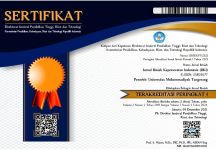The Impact of OSCE Implementation on the Stress Level and Performance of Health Science Students
Abstract
Introduction: Objective Structured Clinical Examination (OSCE) is an evaluation method that is often used in health education to test clinical competence. Aim: This study aims to analyze the impact of the implementation of OSCE on the stress level and academic performance of students of the Faculty of Health Sciences, University of Muhammadiyah Tangerang (Fikes UMT). Methods: This study used a quantitative approach with a cross-sectional design. A total of 150 Fikes UMT students were selected as samples using the purposive sampling technique. Data collection was carried out through academic stress questionnaires and OSCE score results. Data analysis was carried out using paired t-tests and linear regression to determine the relationship between stress and academic performance. Results: There was a significant decrease in student stress levels after the implementation of OSCE (p < 0.001). Before the OSCE, 65% of students experienced high levels of stress, while after the OSCE the number decreased to 40%. In addition, there was a significant negative correlation between stress levels and OSCE values (r = -0.45, p < 0.01), where a decrease in stress levels was associated with improved performance. Conclusion: The implementation of OSCE contributes to lowering students' stress levels and improving their academic performance. Recommendation: Stress management needs to be considered as part of efforts to improve the quality of education in the health sector.
Full Text:
PDFReferences
Abdulghani, H M et al. 2023. “Prevalence of the Medical Student Syndrome among Health Professions Students and Its Effects on Their Academic Performance.” Medicine (United States) 102(43): E35594. https://www.scopus.com/inward/record.uri?eid=2-s2.0-85175741251&doi=10.1097%2FMD.0000000000035594&partnerID=40&md5=ae2cc293eb6810b4fa29d7d280bfa599.
Al-Alwan, Ibrahim et al. 2015. “Effect of Course Coordinator Behavior and Motivation on Students’ Achievement: Results from Five Curriculum Blocks of Two Undergraduate Student Cohorts at King Saud Bin Abdulaziz University of Health Sciences.” Pakistan journal of medical sciences 31(2): 457–61.
Al-Ziftawi, N H et al. 2023. “Cost-Effectiveness and Cost-Utility of Palbociclib versus Ribociclib in Women with Stage IV Breast Cancer: A Real-World Data Evaluation.” International Journal of Environmental Research and Public Health 20(1). https://www.scopus.com/inward/record.uri?eid=2-s2.0-85145972957&doi=10.3390%2Fijerph20010512&partnerID=40&md5=6cef48b38b0bdefec2452dfc2f2a56d9.
Arensman, E et al. 2023. “Implementation and Evaluation of a Multi-Level Mental Health Promotion Intervention for the Workplace (MENTUPP): Study Protocol for a Cluster Randomised Controlled Trial.” Trials 24(1). https://www.scopus.com/inward/record.uri?eid=2-s2.0-85173980888&doi=10.1186%2Fs13063-023-07537-0&partnerID=40&md5=c126b51e82477661d525ded71c4a4191.
Asemu, Yohannes Molla et al. 2021. “Evaluating the Effect of Interventions for Strengthening Non-Physician Anesthetists’ Education in Ethiopia: A Pre- and Post-Evaluation Study.” BMC medical education 21(1): 421.
Bestetti, Reinaldo Bulgarelli et al. 2023. “A Comparison of the Academic Achievement at the End of the Medicine Undergraduate Degree Program Between Students Who Only Used the University Admission Test and Those Who Used the University Admission Test Plus Marks from the High School National Exam (.” Advances in medical education and practice 14: 1185–90.
Boursicot, Katharine et al. 2020. “Conducting a High-Stakes OSCE in a COVID-19 Environment.” MedEdPublish (2016) 9: 54.
Chen, S et al. 2023. “Technical Efficiency Evaluation of Primary Health Care Institutions in Shenzhen, China, and Its Policy Implications under the COVID-19 Pandemic.” International Journal of Environmental Research and Public Health 20(5). https://www.scopus.com/inward/record.uri?eid=2-s2.0-85149993594&doi=10.3390%2Fijerph20054453&partnerID=40&md5=5aebd6b922f6db1eafeb6b2a232c406d.
Du, Y.-X., Y.-T. Zhao, Y.-X. Sun, and A.-H. Xu. 2023. “Acid Sphingomyelinase Mediates Ferroptosis Induced by High Glucose via Autophagic Degradation of GPX4 in Type 2 Diabetic Osteoporosis.” Molecular Medicine 29(1). https://www.scopus.com/inward/record.uri?eid=2-s2.0-85171352496&doi=10.1186%2Fs10020-023-00724-4&partnerID=40&md5=bd0d22a6b09dea078e3324e744d45913.
Duanmu, Youyou et al. 2019. “Correlation of OSCE Performance and Point-of-Care Ultrasound Scan Numbers among a Cohort of Emergency Medicine Residents.” The ultrasound journal 11(1): 3.
Dunne, Karen et al. 2018. “Evaluation of a Coaching Workshop for the Management of Veterinary Nursing Students’ OSCE-Associated Test Anxiety.” Irish veterinary journal 71: 15.
Feng, Sha et al. 2022. “Exploring the Situational Motivation of Medical Students through Clinical Medicine Level Test: A Cross-Sectional Study.” Advances in physiology education 46(3): 416–25.
Ferreira, Érica de Matos Reis et al. 2020. “Stress, Anxiety, Self-Efficacy, and the Meanings That Physical Therapy Students Attribute to Their Experience with an Objective Structured Clinical Examination.” BMC medical education 20(1): 296.
Heggarty, Paula et al. 2020. “Role of Formative Assessment in Predicting Academic Success among GP Registrars: A Retrospective Longitudinal Study.” BMJ open 10(11): e040290.
Humphrey-Murto, Susan et al. 2014. “Does Emotional Intelligence at Medical School Admission Predict Future Academic Performance?” Academic medicine : journal of the Association of American Medical Colleges 89(4): 638–43.
Imafuku, H et al. 2023. “Advantages of Sensor-Augmented Insulin Pump Therapy for Pregnant Women with Type 1 Diabetes Mellitus.” Journal of Diabetes Investigation 14(12): 1383–90. https://www.scopus.com/inward/record.uri?eid=2-s2.0-85170713292&doi=10.1111%2Fjdi.14075&partnerID=40&md5=f9e63efef539064a853a3d39bb37c94a.
Isaak, Robert et al. 2018. “Comparing Real-Time Versus Delayed Video Assessments for Evaluating ACGME Sub-Competency Milestones in Simulated Patient Care Environments.” Cureus 10(3): e2267.
Kassabry, Maysa Fareed. 2023. “Evaluation of Simulation Using Objective Structured Clinical Examination (OSCE) among Undergraduate Nursing Students: A Systematic Review.” International Journal of Africa Nursing Sciences 18(January): 100553. https://doi.org/10.1016/j.ijans.2023.100553.
Khalil, Mahmoud S et al. 2023. “Students, Faculty Perceptions and Effectiveness of the Early Introduction of Clinical Skills Teaching in the Medical Curriculum.” Journal of Taibah University Medical Sciences 18(2): 310–20.
Li, Y et al. 2024. “Hospitalization, Case Fatality, Comorbidities, and Isolated Pathogens of Adult Inpatients with Pneumonia from 2013 to 2022: A Real-World Study in Guangzhou, China.” BMC Infectious Diseases 24(1). https://www.scopus.com/inward/record.uri?eid=2-s2.0-85181236797&doi=10.1186%2Fs12879-023-08929-y&partnerID=40&md5=c47dec75ce6bb2ac92181cba588152e8.
Lin, H et al. 2023. “Beyond Magnification and Illumination: Ergonomics with a 3D Exoscope in Lumbar Spine Microsurgery to Reduce Musculoskeletal Injuries.” Orthopaedic Surgery 15(6): 1556–63. https://www.scopus.com/inward/record.uri?eid=2-s2.0-85158098912&doi=10.1111%2Fos.13737&partnerID=40&md5=c74c076553ac41e10a75c211af2b836f.
Loda, Teresa et al. 2022. “Perspectives, Benefits and Challenges of a Live OSCE during the COVID-19 Pandemic in a Cross-Sectional Study.” BMJ open 12(6): e058845.
Martínez-Pascual, Beatriz et al. 2022. “Autonomic Stress Response of Physiotherapy Student in the Different Scenarios of an Objective Structured Clinical Examination.” BMC medical education 22(1): 811.
Naqi, Syed Ali et al. 2019. “Evaluation of Simulation Methods for Teaching Peripheral Arterial Examination to Medical Students.” BMJ simulation & technology enhanced learning 5(1): 49–51.
Nasiri, Morteza, Shahrzad Yektatalab, Marzieh Momennasab, and Fatemeh Vizeshfar. 2023. “Using Objective Structured Clinical Examination (OSCE) for Circulating and Scrub Skills of First-Semester Operating Room Technology Students: Is It Valid and Reliable?” Heliyon 9(3): e14395.
Pino-Postigo, A et al. 2023. “Improving Oral Presentation Skills for Radiology Residents through Clinical Session Meetings in the Virtual World Second Life.” International Journal of Environmental Research and Public Health 20(6). https://www.scopus.com/inward/record.uri?eid=2-s2.0-85152367015&doi=10.3390%2Fijerph20064738&partnerID=40&md5=cc11410d1b6aa1254a4bb71342b9385a.
Pinto-Escalona, T et al. 2024. “Effects of a School-Based Karate Intervention on Academic Achievement, Psychosocial Functioning, and Physical Fitness: A Multi-Country Cluster Randomized Controlled Trial.” Journal of Sport and Health Science 13(1): 90–98. https://www.scopus.com/inward/record.uri?eid=2-s2.0-85114307615&doi=10.1016%2Fj.jshs.2021.10.006&partnerID=40&md5=b88e6a719b7dbc20eddfba8bc4b0de43.
Piscitelli, Prisco et al. 2022. “Italian Constitution Amended to Include Environmental and Health Protection: A Model for Europe.” The Lancet regional health. Europe 16: 100367.
Rayyan, Mohammad Ramadan. 2024. “The Use of Objective Structured Clinical Examination in Dental Education- a Narrative Review.” Frontiers in oral health 5: 1336677.
Roberts, M M et al. 2023. “Differences in Use of Clinical Decision Support Tools and Implementation of Aspirin, Blood Pressure Control, Cholesterol Management, and Smoking Cessation Quality Metrics in Small Practices by Race and Sex.” JAMA Network Open 6(8): E2326905. https://www.scopus.com/inward/record.uri?eid=2-s2.0-85166053739&doi=10.1001%2Fjamanetworkopen.2023.26905&partnerID=40&md5=782200c7c1c0a608a08585bbdc7c1c3a.
Saeed, Sana, Azam Afzal, Farah Khalid, and Fyezah Jehan. 2023. “Student Experiences of Simulation-Based Learning and Its Impact on Their Performance in Objective Structured Clinical Examination in Pediatrics - A Mixed Method Study.” Pakistan journal of medical sciences 39(4): 978–82.
Shah, Sachita et al. 2020. “Efficacy of an Ultrasound Training Program for Nurse Midwives to Assess High-Risk Conditions at Labor Triage in Rural Uganda.” PloS one 15(6): e0235269.
Tingelhoff, Paul-Dierk, Frank Hufert, Claudia Kiessling, and Bertram Otto. 2024. “Infection Prevention in Medical Education - Results of a Descriptive Cross-Sectional Study in Germany.” GMS journal for medical education 41(1): Doc4.
Wijaya, T T et al. 2023. “Analysis of Factors Affecting Academic Performance of Mathematics Education Doctoral Students: A Structural Equation Modeling Approach.” International Journal of Environmental Research and Public Health 20(5). https://www.scopus.com/inward/record.uri?eid=2-s2.0-85149538771&doi=10.3390%2Fijerph20054518&partnerID=40&md5=60f51556cf129b809ebc892b5b25951e.
Wijeratne, Don Thiwanka et al. 2018. “Sustainability of Physical Exam Skills in a Resident-Led Curriculum in a Large Internal Medicine Program with Competency Based Medical Education.” Canadian medical education journal 9(4): e78–92.
Yang, Ying-Ying et al. 2022. “Equal Z Standard-Setting Method to Estimate the Minimum Number of Panelists for a Medical School’s Objective Structured Clinical Examination in Taiwan: A Simulation Study.” Journal of educational evaluation for health professions 19: 27.
DOI: http://dx.doi.org/10.31000/jiki.v8i1.14270
Article Metrics
Abstract - 1108 PDF - 524DOI (PDF): http://dx.doi.org/10.31000/jiki.v8i1.14270.g6341
Refbacks
- There are currently no refbacks.
Copyright (c) 2025 Creative Common Attribution-ShareAlike 4.0 International License
Jurnal Ilmiah Keperawatan Indonesia (JIKI)
Faculty of Health Sciences
Universitas Muhammadiyah Tangerang.
Jl. Perintis Kemerdekaan I/33, Cikokol - Kota Tangerang, Indonesia







